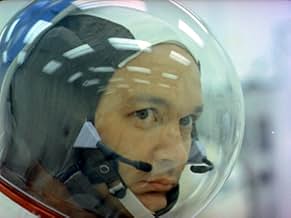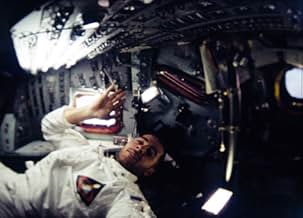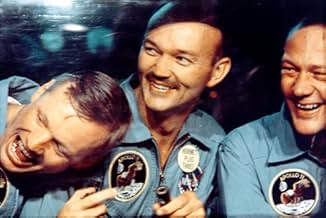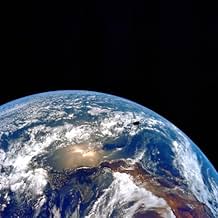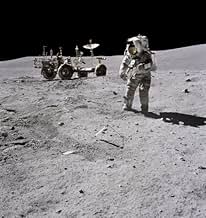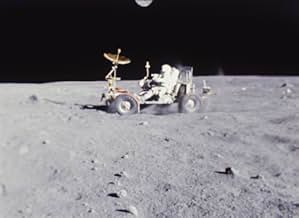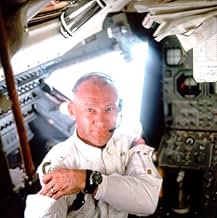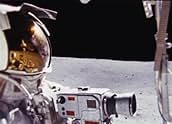Agrega una trama en tu idiomaThe crew members of NASA's Apollo missions tell their story in their own words.The crew members of NASA's Apollo missions tell their story in their own words.The crew members of NASA's Apollo missions tell their story in their own words.
- Premios
- 6 premios ganados y 13 nominaciones en total
Jim Lovell
- Self
- (as James Lovell)
Edgar D. Mitchell
- Self
- (as Edgar Mitchell)
Dave Scott
- Self
- (as David Scott)
William Anders
- Self
- (material de archivo)
Neil Armstrong
- Self
- (material de archivo)
Stephen Armstrong
- Self
- (material de archivo)
Viola Armstrong
- Self
- (material de archivo)
Jules Bergman
- Self
- (material de archivo)
Frank Borman
- Self
- (material de archivo)
Roger B. Chaffee
- Self
- (material de archivo)
Yuri Gagarin
- Self
- (material de archivo)
Opiniones destacadas
And I mean it. The footage and stories in this movie were like nothing I've ever seen. Nor have many others because this film includes new footage and stories of the Apollo space missions never seen nor heard. I went to an advance screening at the Sarasota Film Festival and I was extremely impressed as was the rest of the crowd. There was a very long standing ovation at the end of the movie. The film includes at least one member from each of the Apollo missions telling there stories of the process they went through while preparing to land on the moon. It contains the remarkable footage filmed by the crew members of each mission. If you truly want to be left see a movie that will leave you full of excitement and amaze you must see this movie. The host of the film said this film was the reason movies should be made and he was nothing short of the truth.
10se7en187
I saw this at the Traverse City Film Festival and it was quite the thrill.
Another great documentary about the Apollo program and the astronauts that went to the moon. Some very interesting and inspiring interviews including incredible actual footage of the Apollo 11 mission as it traveled from the Earth to the Moon.
The film contains interviews from many of the astronauts, Mike Collins (the astronaut from Apollo 11 that didn't walk on the moon) was probably the highlight, he was so funny and entertaining. I was a little disappointed that Neil Armstrong wasn't interviewed, but oh well, it was still very good.
Captivating, fun, and an excellent score, I'm sure people will enjoy this well made film.
Another great documentary about the Apollo program and the astronauts that went to the moon. Some very interesting and inspiring interviews including incredible actual footage of the Apollo 11 mission as it traveled from the Earth to the Moon.
The film contains interviews from many of the astronauts, Mike Collins (the astronaut from Apollo 11 that didn't walk on the moon) was probably the highlight, he was so funny and entertaining. I was a little disappointed that Neil Armstrong wasn't interviewed, but oh well, it was still very good.
Captivating, fun, and an excellent score, I'm sure people will enjoy this well made film.
The Apollo moon landings of the late 1960's and early 1970's have been the subject of countless documentaries over the nearly forty years since they occurred. Of all of them, only two films have captured the spirit of Apollo and of the men who took the journey. One of them is Al Reinert's 1989 masterpiece For All Mankind. The other is this film: In The Shadow Of The Moon. And this film easily rivals For All Mankind for the position of best Apollo documentary.
This film takes the idea behind For All Mankind and takes it to the next level. For All Mankind showed us the astronauts as they were then with narration from interviews. In The Shadow Of The Moon, as I wrote, goes the next step further. It shows the astronauts not only as they were, but as they are now. The difference is often times amazing. To go from young fighter pilot to being one of the few men to have left our planet must have been an amazing journey as the film shows and these men prove it. Like For All Mankind, their narration and appearances are the heart and soul of the story being told.
The body of the story is the footage. Where as For All Mankind brilliantly combined all the footage into one large mission, this film doesn't to a degree. It shows us highlights from the program including Apollo 8 and Apollo 11 and then makes a conscience effort not to confuse missions together. This allows for clarity that many have complained about being missing from For All Mankind. But this clarity also allows for something else as well. It allows for depth in story.
That depth can be felt. The truly great thing about this film is that these images, which so many of us are use to seeing on a small television screen, are shown on a big screen. Only on a big screen can one see and feel the depth of the journey that was Apollo. The film has the ability to take images seen many times and bring context and emotion to them. In particular, the footage and still images of the Earth as taken by the astronauts is awe-inspiring. In fact, seeing the famous Earth-rise image from Apollo 8 brought me to tears. And for once, I am not ashamed to admit it.
To be frank, In The Shadow Of The Moon is an amazing piece of work. Not since For All Mankind as a film of any size, shape, or form captured the spirit of Apollo. This is a film about a dream, the men who lived it, and its legacy not only for them but for us as well. I beg you to see this film. Only after that and viewing For All Mankind can one understand not only the legacy of Apollo but our need to explore Space.
This film takes the idea behind For All Mankind and takes it to the next level. For All Mankind showed us the astronauts as they were then with narration from interviews. In The Shadow Of The Moon, as I wrote, goes the next step further. It shows the astronauts not only as they were, but as they are now. The difference is often times amazing. To go from young fighter pilot to being one of the few men to have left our planet must have been an amazing journey as the film shows and these men prove it. Like For All Mankind, their narration and appearances are the heart and soul of the story being told.
The body of the story is the footage. Where as For All Mankind brilliantly combined all the footage into one large mission, this film doesn't to a degree. It shows us highlights from the program including Apollo 8 and Apollo 11 and then makes a conscience effort not to confuse missions together. This allows for clarity that many have complained about being missing from For All Mankind. But this clarity also allows for something else as well. It allows for depth in story.
That depth can be felt. The truly great thing about this film is that these images, which so many of us are use to seeing on a small television screen, are shown on a big screen. Only on a big screen can one see and feel the depth of the journey that was Apollo. The film has the ability to take images seen many times and bring context and emotion to them. In particular, the footage and still images of the Earth as taken by the astronauts is awe-inspiring. In fact, seeing the famous Earth-rise image from Apollo 8 brought me to tears. And for once, I am not ashamed to admit it.
To be frank, In The Shadow Of The Moon is an amazing piece of work. Not since For All Mankind as a film of any size, shape, or form captured the spirit of Apollo. This is a film about a dream, the men who lived it, and its legacy not only for them but for us as well. I beg you to see this film. Only after that and viewing For All Mankind can one understand not only the legacy of Apollo but our need to explore Space.
Powerfully put together NASA documentary highlights Apollo 11's historic run amongst other aged adventurers often stirring recollections.
Undoubtedly this is some of the finest public extraterrestrial footage ever married into film, and for that alone this noble salute to a bygone America and the heroes that inhabited it is a must see. Taking a trip to the moon with these brave astronauts has never been captured as intimately, helping viewers begin to feel what it must be like to be looking down from space like never before.
Combined with excellent musical scoring, David Sington's emotional remembrance and vicarious lift-offs belongs in many, many star watcher's collections.
Undoubtedly this is some of the finest public extraterrestrial footage ever married into film, and for that alone this noble salute to a bygone America and the heroes that inhabited it is a must see. Taking a trip to the moon with these brave astronauts has never been captured as intimately, helping viewers begin to feel what it must be like to be looking down from space like never before.
Combined with excellent musical scoring, David Sington's emotional remembrance and vicarious lift-offs belongs in many, many star watcher's collections.
Saw this film at Sundance, the screening reserved for the Grand Jury World Documentary Award Winner. Wow! I have seen many of the preceding documentaries on the history of the American space program, the Apollo program in particular. Where this documentary exceeds all previous efforts was in revealing the humanity of the astronauts. Most other documentaries focus on the politics which motivated and technical hurdles overcome in the American space program. David Sington brilliantly uses only the astronauts voices for narration of facts and more with newly released footage from NASA, as well as a lot of footage we've all seen before. Because of the free rein given to the astronauts in the interviews, you see many sides of each revealed. For instance, Mike Collins (who has heretofore rarely been interviewed) reveals wonderful humor and joy in his accomplishments. You find out more about their worries and fears, how they look back on their work and what they were thinking at the time. They are all revealed as nice guys with whom you would want to spend an afternoon.
Strangely absent, but it works well in the end, was Armstrong. He gives virtually no interviews. In a way, having everyone else talk about him is maybe better than him talking.
And, the various conspiracy theories are dealt with in the end credits. This is a great place to do it. In films we sometimes see the end credits used for humorous out-takes, epilogue commentary, and so forth. By dealing with the conspiracy theories in an appended manner during the credits, the film refuses to elevate them to the level of legitimacy that the remainder of the facts and biographical material, yet still dismisses them. The single best dismissal is this: If it was all faked, why did they fake it so many times? Wouldn't once have been enough?
See this film when it comes to your neighborhood theater, as it has been announced as having a distribution deal. It is worth seeing on the big screen for its amazing visuals.
Strangely absent, but it works well in the end, was Armstrong. He gives virtually no interviews. In a way, having everyone else talk about him is maybe better than him talking.
And, the various conspiracy theories are dealt with in the end credits. This is a great place to do it. In films we sometimes see the end credits used for humorous out-takes, epilogue commentary, and so forth. By dealing with the conspiracy theories in an appended manner during the credits, the film refuses to elevate them to the level of legitimacy that the remainder of the facts and biographical material, yet still dismisses them. The single best dismissal is this: If it was all faked, why did they fake it so many times? Wouldn't once have been enough?
See this film when it comes to your neighborhood theater, as it has been announced as having a distribution deal. It is worth seeing on the big screen for its amazing visuals.
¿Sabías que…?
- TriviaOf all the astronauts who appeared in the film, only Buzz Aldrin demanded to be paid.
- ErroresThe 1202 alarm was not a programming error in the Apollo Guidance Computer, but rather a hardware design bug, already documented by Apollo 5 engineers. Since the 1202 alarm had occurred only once during testing, NASA decided to go with the radar hardware with known problems instead of using untested newer alternatives with unknown problems.
- Citas
Jim Lovell: We changed our plans on Apollo 8. They changed the mission from an Earth orbital type to a flight to the Moon. And it was a bold move. It had some risky aspects to it. But it was a time when we made bold moves.
- ConexionesAlternate-language version of Universum: Im Schatten des Mondes (2009)
Selecciones populares
Inicia sesión para calificar y agrega a la lista de videos para obtener recomendaciones personalizadas
- How long is In the Shadow of the Moon?Con tecnología de Alexa
- Which astronauts participated in this documentary?
Detalles
- Fecha de lanzamiento
- Países de origen
- Sitios oficiales
- Idiomas
- También se conoce como
- Vùng Khuất Của Mặt Trăng
- Productoras
- Ver más créditos de la compañía en IMDbPro
Taquilla
- Presupuesto
- USD 2,000,000 (estimado)
- Total en EE. UU. y Canadá
- USD 1,134,358
- Fin de semana de estreno en EE. UU. y Canadá
- USD 38,281
- 9 sep 2007
- Total a nivel mundial
- USD 2,161,369
- Tiempo de ejecución1 hora 40 minutos
- Color
- Mezcla de sonido
- Relación de aspecto
- 1.85 : 1
Contribuir a esta página
Sugiere una edición o agrega el contenido que falta

Principales brechas de datos
By what name was In the Shadow of the Moon (2007) officially released in India in English?
Responda





